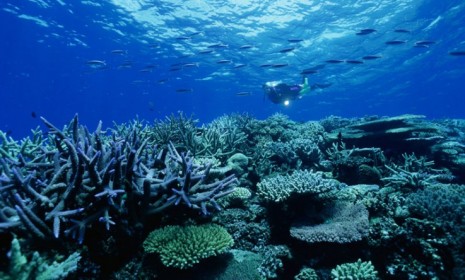Do the world's coral reefs have herpes?
New research suggests that the pesky virus might be causing the diverse and vital ecosystems to slowly die

The world's coral reefs are dying, and experts think global warming and pollution are among the main causes. But new research suggests that there might be another culprit: Herpes. An abundance of viruses, in the herpes family, could be playing a role in decimating the ocean's coral populations. Here's what you should know about the strange findings:
Herpes?
Evidently. The new study, published in the Journal of Experimental Marine Biology and Ecology, uncovered several variations of herpes-like viruses infecting coral populations around the globe. "We've identified 22 kinds of emerging disease that affect corals," study author Rebecca Vega-Thurber of Oregon State University tells Discovery News. "Most researchers have only looked at bacteria. But we suspect viruses may play a role in this as well."
The Week
Escape your echo chamber. Get the facts behind the news, plus analysis from multiple perspectives.

Sign up for The Week's Free Newsletters
From our morning news briefing to a weekly Good News Newsletter, get the best of The Week delivered directly to your inbox.
From our morning news briefing to a weekly Good News Newsletter, get the best of The Week delivered directly to your inbox.
And the herpes is killing the coral?
Researchers were "shocked" to find just how many coral viruses belonged to the herpes family. Still, while herpes might be one cause of the decline, the exact relationship between the viruses and coral is still somewhat unclear. "Just because you harbor a virus doesn't mean you are getting sick from it," cautions Vega-Thurber.
Did humans pass on the virus?
It's possible. "Coral can be adversely affected by human disease," says Melissa Locker at TIME. In one case, unrelated to this study, scientists found that a bacterium known as Serratia Marcescens caused "white pox" in a coral population in the Caribbean. The disease was originally passed on by humans. Vega-Thurber and her team are now trying to determine whether the coral are passing the viruses among each other, or if other animals — like fish — could be spreading the diseases.
A free daily email with the biggest news stories of the day – and the best features from TheWeek.com
Why are coral so important?
The plant-like animals are the "building blocks of the tropical seas," says Vega-Thurber. They are among Earth's oldest living creatures, evolving roughly 500 million years ago. Yet, in the Caribbean Sea alone, the number of coral reefs has plummeted by a staggering 80 percent since the 1970s. "Understanding the herpes hazard," says Tim Wall at Discovery, could lead to diagnoses for previously mysterious ailments affecting coral reefs."
Sources: Cosmos Magazine, Discovery News, Swell UK, TIME
-
 Political cartoons for February 1
Political cartoons for February 1Cartoons Sunday's political cartoons include Tom Homan's offer, the Fox News filter, and more
-
 Will SpaceX, OpenAI and Anthropic make 2026 the year of mega tech listings?
Will SpaceX, OpenAI and Anthropic make 2026 the year of mega tech listings?In Depth SpaceX float may come as soon as this year, and would be the largest IPO in history
-
 Reforming the House of Lords
Reforming the House of LordsThe Explainer Keir Starmer’s government regards reform of the House of Lords as ‘long overdue and essential’